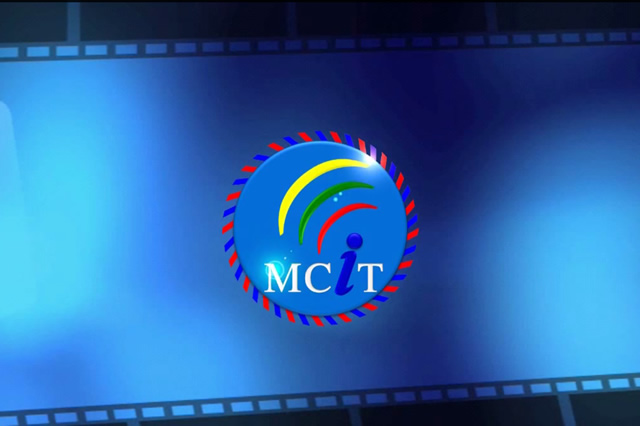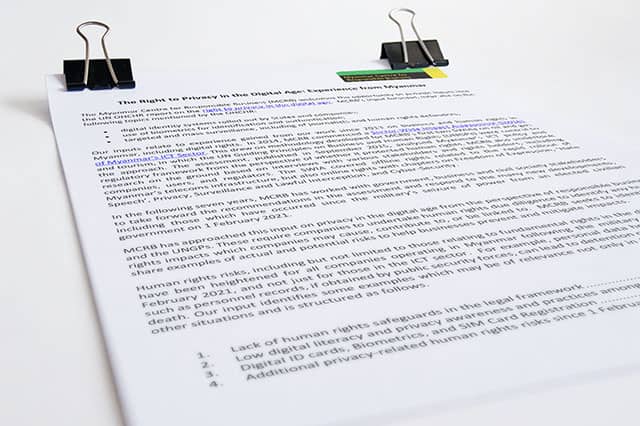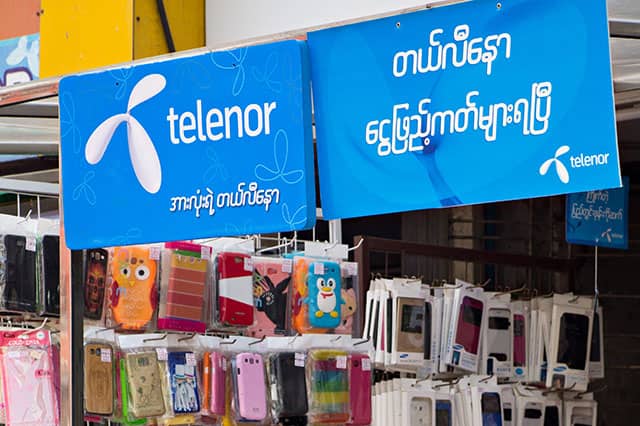Civil Society dissects draft Telecoms Plan

This article was originally published in the Myanmar Times on September 8, 2015.
By Catherine Trautwein | Tuesday, 08 September 2015
A newly published draft telecommunications master plan has been met with praise from civil society organisations – but also calls for beefed-up human rights considerations and further clarity on issues such as privacy and policy execution.
View this article in its original location
Just one year ago, telecoms in Myanmar looked very different. The market’s first foreign entrant, Ooredoo, had just launched services and customers were getting used to the idea of SIM cards costing K1500 – not the hundreds of dollars for which they had been sold for in the past.
The pace of change has meant mobile uptake has outstripped policy reform. The 2013 Telecoms Law left many unanswered questions. The Ministry of Communications and Information Technology (MCIT) followed up by holding consultations and interviews, and studying international telecoms regimes, before drafting a new master plan, which was made public in July.
However, the Myanmar Centre for Responsible Business (MCRB), one of the organisations that submitted comments on the draft, said its airing “was not widely made known”. And though the deadline for comments was postponed by one week, the timeline was short compared to other consultations, according to Peter Micek, senior policy counsel for digital rights firm Access – another group that wrote comments on the draft.
Three groups published their thoughts on the draft – MCRB, Access, and Myanmar ICT for Development Organisation (MIDO), which partnered with LIRNEasia. All had positive things to say about the document.
Mr Micek described the draft master plan as “the most mature thing I’ve seen from the Myanmar government”.
“It’s leaps and bounds past the last consultation,” he said. Meanwhile, MIDO program manager Ma Htaike Htaike Aung said many components of the draft were “very, very good”.
“Overall we can see MCIT’s enthusiasm for drafting it out,” she said.
The MCRB applauded the quality and clarity of the draft, “which presents thoughtful consideration and commitment to reforming Myanmar’s telecommunications sector, creating a new ICT ‘ecosystem’ and fostering innovation and growth”.
Mapping growth
Acknowledging the sector must reform, the document maps out Myanmar’s journey from maturing market to “mobile-first, digitally connected nation” with directions to get it there.
Since 2013, the country has seen teledensity spike to nearly half the population and upward of US$2.8 billion in foreign investment, it says.
The ministry aims to connect Myanmar citizens – more than 90pc of the population before the end of 2020, with half able to hop on high-speed services starting at 7.2 MB per second – strengthen the country’s economy and explore digital initiatives around health and learning, and to move forward on e-government services, the document said.
Its stated objectives are to create build up Myanmar’s nationwide infrastructure, deliver content and services for Myanmar people, and to create a favourable institutional framework, which includes an independent regulator.
MCRB recommended in its comments that in Myanmar’s vision for connecting the country, the master plan incorporate rights to freedom of expression.
Mr Micek said in a blog post that Access and MCRB agreed on many items, advising MCIT to “place human rights like privacy, free expression, and affordable, equitable access to information on equal footing with its goal of aggressively developing the nation’s telecommunications infrastructure”.
Both backed adding promises to be network neutral, or fair to all content, and for the government to go further on the issue of network access.
MCRB suggested MCIT should clarify circumstances under which the government would shut down communication services, and Access proposed the government should promise not to “require installation of or implement any ‘kill switch’ or other technology to shut down communications networks, for any reason”.
In the master plan, the MCIT claims telecoms security as its jurisdiction and says it will help put a national cyber security policy into practice once it has been established. The ministry is also working on the issue of legal interception with local and international support.
But the MCRB said that “to address the current legal vacuum, the master plan needs to identity who in the Union government will take the lead on creating this much needed regulatory framework, and what the timeframe will be”.
MCRB also said in its comments that ideas on user and data privacy protection should be written into the master plan. The draft currently says data privacy matters are outside MCIT’s jurisdiction, and that they’ll be dealt with elsewhere in the government.
This will have major implications for Myanmar’s millions of mobile users, many of whom have signed up in the past 12 months.
In the meantime, the master plan expresses a decided preference for mobile connectivity.
MIDO and LIRNEasia, who teamed up to give feedback on the draft master plan, said that the emphasis on mobile-first might be unwise. “Why lock into mobile?” they said.
MCIT sees funding from inside and outside the country helping with its connectivity goals, but also that telcos may need extra help covering Myanmar’s more remote territories.
To this end, the draft outlines setting up a universal service fund (USF) in 2017, for telcos to draw from later on, so long as they hit the objectives set out in their licences.
“The purpose of the USF will be to allocate funds to support connectivity to basic services and high-speed internet in remote areas of the country, where commercial network economics cannot justify the build-out alone,” the document said, adding that MCIT wants to keep the price of broadband access at less than 5pc of the average income.
However, the draft also acknowledges that USFs have met with mixed success elsewhere.
Ma Htaike Htaike Aung said that USFs face challenges around efficient use and transparency, and can end up being a burden on consumers. Funding for it will come from a tax on the telecoms industry, she said.
MCRB suggested the fund’s name should be adjusted to address universal access as well, and should be preceded by a policy resulting from open debate and consultations with parliament and other players.
“Purely government-run [models are] closely associated with failure to achieve objectives including the disbursement of funds,” MCRB added in its comments.
Under the draft, it’s unclear how certain policies will be put into practice, according to MIDO.
The ministry will also head up enabling e-government initiatives, though the document said the eGov program will be spearheaded by a distinct program spanning all government departments. The ministry is working on an eGov support plan to be put out in the third quarter of financial year 2015.
Ma Htaike Htaike Aung expressed concerns that the MCIT will need backup on eGov plans.
“It should really come from the level of the president,” she said.
The draft master plan has also introduced a push towards independence among the government’s telecoms players – the ministry, the Posts and Telecommunications Department (PTD), and its operator, Myanma Posts and Telecommunications (MPT).
The market regulator, now the PTD, will become an independent entity called the Myanmar Communications Commission (MCC) by next month.
Its responsibilities will include licencing, spectrum management, infrastructure sharing, interconnection and consumer rights. The commission’s chair will be on a level with members of the Cabinet.
Meanwhile MPT, which now counts between 12 and 14 million customers on its mobile network, will corporatise while remaining state-owned.
“The ministry has decided to corporatise MPT with immediate effect, so that it transfers from being a government department housed under the MCIT, to a wholly independent state-owned corporation,” the document said.
Much effort remains before the master plan’s goals are accomplished, especially with the dirty work of hammering out details under way.
Next, Mr Micek said that Access would like the government to publish another final draft for consultation, with clear communication.
“Give us a month and let’s get this in the books and really move on to the meat” – binding regulations on lawful intercept, cyber security and other topics that impact human rights online, he said.
အထက်ပါအကြောင်းအရာနှင့်ပတ်သတ်၍ ဆက်လက်ဖတ်ရှုလိုပါက
- Information and Communication Technologies (ICT) Sector and Digital Rights
- MCRB မှ ဒစ်ဂျစ်တယ်ခေတ်တွင် ပုဂ္ဂိုလ်ဆိုင်ရာလွတ်လပ်ခွင့်နှင့်ပတ်သက်၍ OHCHR သို့ အကြံပြုချက် ထည့်သွင်းတင်ပြသည်
- MCRB မှ နည်းပညာကဏ္ဍအတွက် UNGPs ၏ လက်တွေ့ကျင့်သုံးမှုကို OHCHR သို့ အကြံပြုချက် ထည့်သွင်းတင်ပြသည်
- ဆိုက်ဘာလုံခြုံရေးဥပဒေ မူကြမ်းနှင့် သက်ဆိုင်သော နောက်ဆုံးပေါ်အခြေအနေနှင့် ယင်း၏ ဒစ်ဂျစ်တယ် အခွင့်အရေးနှင့် ဒစ်ဂျစ်တယ် စီးပွားရေးအပေါ် သက်ရောက်မှုများ
- မြန်မာနိုင်ငံ၏ဆိုက်ဘာလုံခြုံရေးဆိုင်ရာ ဥပဒေမူဘောင်အား နိုင်ငံတကာစံချိန်စံနှုန်းများနှင့်အညီ တည်ဆောက်ရန် လိုအပ်သည်
 English
English မြန်မာ
မြန်မာ မြန်မာ (unicode)
မြန်မာ (unicode)











